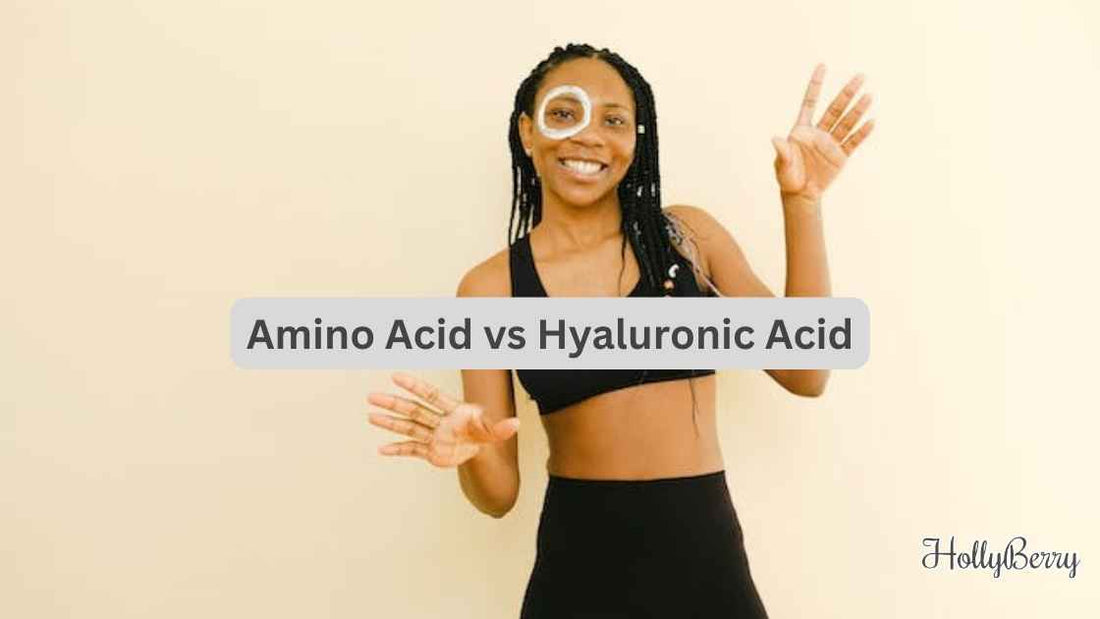
Amino Acid vs Hyaluronic Acid
Share
Understanding Their Distinct Roles in Skincare

Amino acids and hyaluronic acid are both vital components in the realm of skin health, with distinctive functions and benefits. Amino acids, often heralded as the building blocks of proteins, serve a crucial role in maintaining skin hydration, elasticity, and overall resilience.
These organic compounds are integral to the synthesis of collagen and elastin, which are essential for a firm and youthful complexion. Their ability to hydrate and protect the skin is due in part to their role as precursors of peptides, which assist in smoothing fine lines and encouraging the skin's healing processes.
Hyaluronic acid, on the other hand, is a powerful humectant that can hold up to a thousand times its weight in water, making it an extraordinary agent for retaining moisture within the skin.
Its presence in skincare is associated with enhanced moisture retention, leading to a plumped appearance and the reduction of fine lines. Hyaluronic acid's versatility extends to its use in various forms, ranging from topical serums to injectable fillers, each designed to address specific aspects of skin ageing and hydration needs.
The comparison of amino acids with hyaluronic acid in skincare routines reveals that while both are essential for maintaining skin health, they operate through different mechanisms and deliver unique benefits.
The synergetic use of these two ingredients in skin care formulations can create a comprehensive approach to hydration, repair, and overall skin maintenance, which is why they are commonly found across a wide range of personal care products.

Order Hollyberry serum here
Biochemical Properties and Skin Benefits
Amino acids and hyaluronic acid both play crucial roles in skin health and anti-aging. They differ in their structure and function, each offering specific benefits within skincare routines.
Role in Hydration and Health
Amino Acids: They are fundamental to maintaining skin's hydration and overall health. Serving as the building blocks of proteins like collagen and elastin, amino acids help to retain moisture, maintain the skin barrier, and support skin repair.
Hyaluronic Acid: A powerful humectant, hyaluronic acid can hold up to 1000 times its weight in water, significantly contributing to the skin's water retention and hydration. It aids in maintaining a plump and hydrated appearance, making it essential for healthy skin.
Contribution to Anti-Aging and Collagen Production
Collagen Production:
- Amino Acids: They are integral to collagen synthesis, working to help skin maintain its strength and elasticity, thus mitigating signs of aging.
- Hyaluronic Acid: While not directly involved in collagen production, it helps to create an optimal environment for collagen synthesis by keeping the skin hydrated and supple.
Anti-Aging:
- Amino Acids: These compounds assist in the repair of skin damage and reduce the appearance of aging by supporting the skin's natural regenerating processes.
- Hyaluronic Acid: Its ability to fill the space between collagen and elastin fibres reduces the visibility of fine lines and wrinkles, offering anti-aging benefits.
Comparative Analysis of Amino Acid and Hyaluronic Acid
| Property | Amino Acid | Hyaluronic Acid |
|---|---|---|
| Molecular Function | Building blocks for proteins, enhance repair and collagen synthesis. | Humectant that provides hydration and promotes a youthful skin appearance. |
| Skin Benefits | Supports elasticity, soothes skin, and acts as antioxidants. | Improves moisture levels, assists in anti-aging, and enhances skin texture. |
| Use in Skincare | Found in serums, creams, and various skincare products. | Commonly used in serums, moisturisers, and injectable fillers. |
| Suitability | Suitable for various skin types and often found in vegan and cruelty-free products. | Ideal for dry, dehydrated skin and also available in vegan formulations. |
Application in Skincare Routines

Amino Acids: Their reparative and antioxidant properties make them suitable for inclusion in daily skincare routines. Products like serums and creams are infused with amino acids to support skin health and counteract environmental stressors.
Hyaluronic Acid: Recommended for use in both morning and evening skincare regimens. It is layered under moisturisers or mixed into serums for enhanced hydration. Popular brands like The Ordinary offer hyaluronic acid products that cater to various skin types and are often vegan and cruelty-free.
Product Formulation and Selection
When selecting skincare products, it's essential to assess their components, scrutinise reviews to gauge their efficacy, and consider how they might affect different skin types and concerns.
Analysis of Ingredients
In the context of skincare formulation, amino acids and hyaluronic acid are both prevalent as active ingredients.
Amino acids act as building blocks of proteins and are critical in maintaining skin's hydration, texture, and resilience. Hyaluronic acid, on the other hand, is a potent humectant that can attract and retain moisture, significantly benefiting dry skin.
Ingredients to look for:
- Hyaluronic acid (INCI: Sodium hyaluronate)
- Amino acids: Glycine, proline, histidine, etc.
Polymers and oils can also be included in formulations to improve product texture and provide additional benefits such as occlusion or antioxidant protection.
Considerations for Specific Skin Types and Concerns
Different skin types and concerns necessitate tailored approaches to product selection. Sensitive skin may require serums or moisturisers free from irritants and allergens. For those with acne, choosing non-comedogenic ingredients which don't block pores is crucial.
- Dry skin benefits from hyaluronic acid and emollients to reduce dryness.
- Oily skin may prefer light, gel-based formulations with humectants.
- Acne-prone skin should look for serums or supplements that include ingredients to address their specific concerns, such as niacinamide or zinc.
The insights provided above should assist individuals in making informed decisions when selecting skincare products, ensuring components suit their specific skin necessities and concerns.
